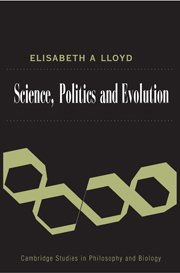Book contents
- Frontmatter
- Contents
- 1 The Nature of Darwin's Support for the Theory of Natural Selection
- 2 A Semantic Approach to the Structure of Population Genetics
- 3 Confirmation of Ecological and Evolutionary Models
- 4 Units and Levels of Selection
- 5 Species Selections on Variability
- 6 An Open Letter to Elliott Sober and David Sloan Wilson, Regarding Their Book, Unto Others: The Evolution and Psychology of Unselfish Behavior
- 7 Problems with Pluralism
- 8 Normality and Variation: The Human Genome Project and the Ideal Human Type
- 9 Evolutionary Psychology: The Burdens of Proof
- 10 Objectivity and the Double Standard for Feminist Epistemologies
- 11 Science and Anti-Science: Objectivity and Its Real Enemies
- 12 Pre-Theoretical Assumptions in Evolutionary Explanations of Female Sexuality
- References
- Index
9 - Evolutionary Psychology: The Burdens of Proof
Published online by Cambridge University Press: 27 February 2010
- Frontmatter
- Contents
- 1 The Nature of Darwin's Support for the Theory of Natural Selection
- 2 A Semantic Approach to the Structure of Population Genetics
- 3 Confirmation of Ecological and Evolutionary Models
- 4 Units and Levels of Selection
- 5 Species Selections on Variability
- 6 An Open Letter to Elliott Sober and David Sloan Wilson, Regarding Their Book, Unto Others: The Evolution and Psychology of Unselfish Behavior
- 7 Problems with Pluralism
- 8 Normality and Variation: The Human Genome Project and the Ideal Human Type
- 9 Evolutionary Psychology: The Burdens of Proof
- 10 Objectivity and the Double Standard for Feminist Epistemologies
- 11 Science and Anti-Science: Objectivity and Its Real Enemies
- 12 Pre-Theoretical Assumptions in Evolutionary Explanations of Female Sexuality
- References
- Index
Summary
INTRODUCTION
Richard C. Lewontin's interventions against the acceptance of speculative, untested, yet socially influential claims about human evolution – the most politically significant parts of “sociobiology” – stand as one the most important and controversial aspects of his career. The criticisms expressed in his papers on adaptation (Lewontin 1978, 1985), and in the famous paper he coauthored with Stephen Jay Gould (Gould and Lewontin 1979), have spurred methodological self-awareness about claiming adaptation in many quarters. Although Lewontin's papers have attained the status of obligatory citations, this does not mean that their critical conclusions have been fully absorbed. Indeed, there are recent authors who present G. C. Williams's 1966 book – which was, after all, about the high standards that must be enforced in order to claim an evolutionary adaptation – and Gould and Lewontin's 1979 paper – which embodied an insistence on the high standards that must be enforced in order to claim an evolutionary adaptation – as being on opposite sides of the fence with regard to evolutionary adaptation (Cosmides and Tooby 1995, p. 7l; Pinker and Bloom 1992, p. 454).
Chief among those who claim to live in a post-Lewontinian age of adaptationism – one in which an enlightened and modest approach to adaptation is practiced, and the strict standards of scientific evidence enthusiastically adhered to – are those practicing what they call “evolutionary psychology,” most prominently, Leda Cosmides and John Tooby.
- Type
- Chapter
- Information
- Science, Politics, and Evolution , pp. 148 - 169Publisher: Cambridge University PressPrint publication year: 2008



